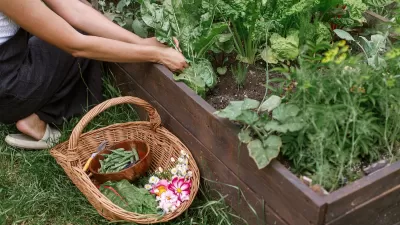Food systems expert Maggi Adamek talks with The Planning Commission Podcast about the complexities of food policy, from local zoning ordinances to international trade agreements.

You’ve probably heard of missing middle housing. But have you heard of missing middle farming?
That’s what food systems expert Maggi Adamek of Minneapolis-based Terra Soma wants planners to consider as they work to create healthier communities. In this episode of The Planning Commission Podcast, Adamek discusses the ways in which food systems and farming dramatically changed after World War II to make growing food more efficient and preparing food more convenient.
This is when the United States moved away from localized food production. Instead, food markets were pushed to the edges, dominated on one end by industrial farming with small-scale, rural, and community food systems intact but unable to feed urbanized population clusters. Thus, missing middle farming.
“Ag policy from the Nixon Administration moved farmers away from producing things that people would eat to growing things like corn and soybeans used for biofuels and feeding livestock,” Adamek said. “You would really have to hunt to get a healthy option outside of your own home. It got to the point where obesity and related dietary diseases rates proliferated.”
That’s when the planning profession started to hear the cry from health professionals. “The planning community, as a whole, really felt a call to action around embedding thinking about access and healthy eating as core components to community design,” Adamek shared.
Planners began asking questions like: How are people going to have access to a grocery store? How are we going to support our farmers’ markets? How do we plan and zone for community gardening space? How do we support the kinds of positive activity that will improve people’s access to affordable healthy food?
These planning approaches, as well as the external influences on food production and food distribution, are discussed throughout the episode.
The Planning Commission is a spirited debate by planners, for planners. This independent outlet for all things planning explores the serious and lighter sides of the profession, poses probing and creative questions to guests, and always pairs the episode guest and topic with a choice libation. Listen to the podcast for a special offer from Planetizen.
FULL STORY: Season 2 Episode 16 Food Systems Planning

Planetizen Federal Action Tracker
A weekly monitor of how Trump’s orders and actions are impacting planners and planning in America.

Map: Where Senate Republicans Want to Sell Your Public Lands
For public land advocates, the Senate Republicans’ proposal to sell millions of acres of public land in the West is “the biggest fight of their careers.”

Restaurant Patios Were a Pandemic Win — Why Were They so Hard to Keep?
Social distancing requirements and changes in travel patterns prompted cities to pilot new uses for street and sidewalk space. Then it got complicated.

Platform Pilsner: Vancouver Transit Agency Releases... a Beer?
TransLink will receive a portion of every sale of the four-pack.

Toronto Weighs Cheaper Transit, Parking Hikes for Major Events
Special event rates would take effect during large festivals, sports games and concerts to ‘discourage driving, manage congestion and free up space for transit.”

Berlin to Consider Car-Free Zone Larger Than Manhattan
The area bound by the 22-mile Ringbahn would still allow 12 uses of a private automobile per year per person, and several other exemptions.
Urban Design for Planners 1: Software Tools
This six-course series explores essential urban design concepts using open source software and equips planners with the tools they need to participate fully in the urban design process.
Planning for Universal Design
Learn the tools for implementing Universal Design in planning regulations.
Heyer Gruel & Associates PA
JM Goldson LLC
Custer County Colorado
City of Camden Redevelopment Agency
City of Astoria
Transportation Research & Education Center (TREC) at Portland State University
Camden Redevelopment Agency
City of Claremont
Municipality of Princeton (NJ)





























